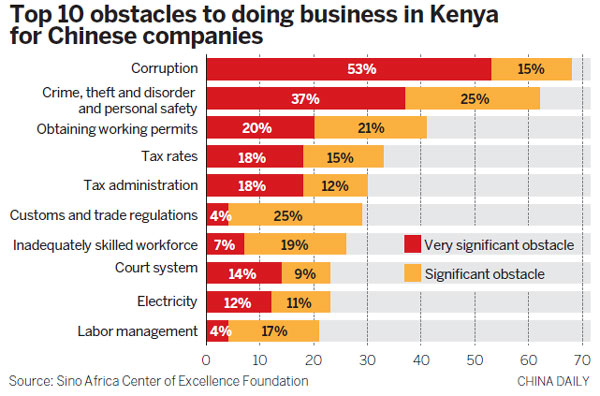Study gives lie to labor claims

Chinese companies in Kenya employ locals in droves
Only one out of every 10 employees of Chinese companies in Kenya is Chinese, a recent report says. This disproves criticism that Chinese bring too many workers to Africa, a misconception that experts say is the result of poor public relations practices that results in the lack of transparency about the way companies work.
The Business Perception Index Kenya-2014, published by Sino-Africa Center of Excellence Foundation in Kenya, says 90 percent of employees in Chinese manufacturing and construction companies in Kenya are locally hired, compared with 82 percent in the service sector.
Seventy-five Chinese companies in Kenya were questioned for the survey. About half are in manufacturing and construction and the rest in services. One third are state-owned companies.
The average number of employees in a Chinese construction or manufacturing company in Kenya is 762, and in the service sector 45.
In Kenya there are more than 40,000 Chinese and about 400 Chinese companies. The companies are spread across every sector, with those in construction predominating.
The report says 93 percent of Chinese companies employ Kenyans, and this rises to 100 percent if only the 65 companies with more than five employees are taken into account.
More than 60 percent of the companies say they are willing to replace Chinese workers with locals, and private companies show more willingness to do that.
At least two local factors account for this willingness: the high cost of bringing in Chinese and tightening immigration policies in Kenya.

It is five to six times more expensive to import a Chinese technical worker as it is to employ a local technician, and it has become more expensive to import Chinese workers after the Kenyan government changed its immigration policy in 2013, the report says. It now costs the equivalent of about $4,600 for a foreign employee to obtain a two-year work permit.
Chinese companies say immigration procedures and obtaining work permits are among the biggest obstacles to doing business in Kenya.
To try to dispel the misperception about Chinese companies not employing locals, the report suggests better public relations strategies to make the operation of Chinese companies more transparent.
Liu Qinghai, an Africa analyst at the Institute of African Studies at Zhejiang Normal University, says: "Many Chinese companies in Africa don't have disclosure power and they also don't have a good public relations strategy."
Some Chinese companies employ very few locals when they start their business in Africa. But they employ many more when they expand their business, she says, adding that false impressions may be left if the media do not report on this.
The report says: "When Chinese corporates start operating in the country, on average they hire 102 local full-time employees, while at the time of the survey, on average Chinese companies hired 214 local full-time employees, more than double that of when they first started operation."
Liu says some Western researchers base claims that Chinese companies employ few locals on media reports and fail to carry out studies in the field.
Liu Naiya, an Africa analyst at the Chinese Academy of Social Sciences, says misconceptions are also the result of Western countries failing to understand how China and Africa work together in the field of labor.
"Western countries usually don't aid Africa in labor-intensive projects like construction, so they usually don't know the situation Chinese companies face in construction projects in the continent. Because of this lack of understanding they often ask why Chinese companies don't give the work Chinese workers do to locals who can do the work just as well.
"China itself has faced labor shortages over the past four or five years, and there is no need to export labor to solve employment problems."
houliqiang@chinadaily.com.cn

(China Daily Africa Weekly 01/23/2015 page21)
Today's Top News
- 2nd round of Iran-US talks held in 'constructive' atmosphere, new talks to be scheduled: Iran's FM
- The Year of the Horse: A new gallop for the Spring Festival Gala
- 2nd round of indirect Iran-US nuclear talks begins in Geneva
- In the face of history, Japan's discomfort telling
- Xi Story: Celebrating Spring Festival with the people
- PLA conducts combat readiness patrols in S. China Sea






























